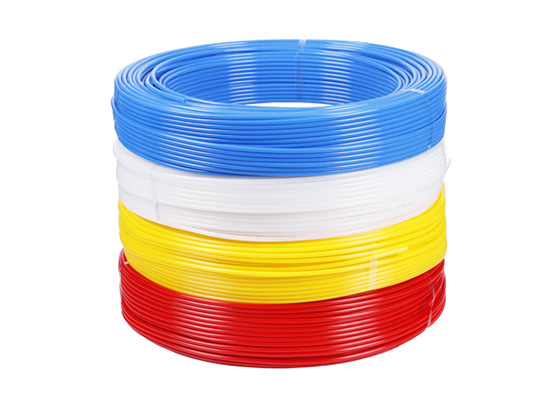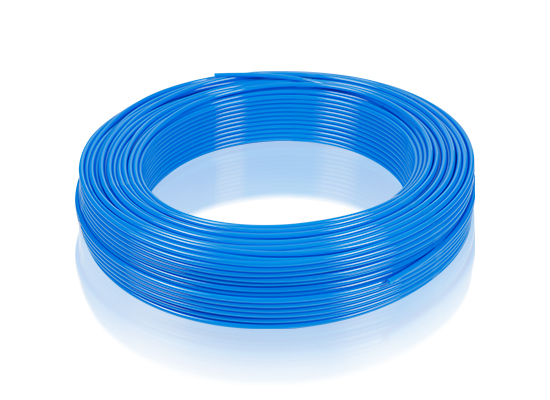Introduce
What is nylon tubing?
Nylon tubing is made from polyamide resin, which is a synthetic compound made from natural plastic and adhesives.Sometime we can call it polyamide resin pipe,nylon material features lasting durable time and moisture-resistant, impact-resistant, chemical-resistant, and abrasion-resistant.
Nylon hose is available in single-layer and multi-layer configurations. Modifying agents, such as high-temperature resistant agents, can be added during processing to significantly enhance the nylon pipe's heat resistance,Up to 30% or more. Due to the excellent mechanical and wear-resistant properties of polyamide compounds, Nylon tubing is widely used in industrial and commercial applications.
Because nylon has good temperature resistance, nylon tube can also be called nylon heat resistant tubing,Nylon tube can divide into various types according to the differences in function, characteristics, structure and material,including PA6, PA66, PA11/PA12 applyied to different application industry conditions

Core advantages of using nylon tubing
◆ Good chemical corrosion resistance
◆ Lightweight and moderate flexibility:Compared with metal pipes, nylon is significantly lighter, which helps reduce the overall weight of the system and improve efficiency.
◆ Impact and fatigue resistance well
◆ Various Model types
◆ Excellent mechanical strength and pressure resistance
Different characteristics of nylon tubing
Nylon heat resistant tubing exhibits higher mechanical strength and tensile strength compare to Polyurethane Tubing. Nylon hose is wear-resistant, have good toughness, and demonstrate significant stability in terms of tensile and bending properties.
Easy to install, no need for any special tools. The excellent overall performance of nylon hose is unmatched by copper, steel, or rubber hoses, making it an ideal substitute for copper, steel, and rubber pipes.
According to excellent heat resistant, when in low or high temperature, nylon hose can maintain its chemical and physical properties.For example, PA12 Nylon Tube has excellent low-temperature resistance and can be used in the temperature range of -40 ℃ to 120 ℃,Nylon tubes are lightweight, moisture-resistant, resistant to saltwater and seawater, and exhibit good aging resistance. They are also resistant to corrosion, alkalis, and salt solutions, while showing good resistance to weak acids, engine oil, gasoline, aromatic hydrocarbons, and general solvents.
This inertness effectively shields against corrosion from gasoline, oil, fats, weak alkalis, and more. This makes nylon tube widely used in compressed air systems, lubrication systems, flammable oil fluid pipelines, hydraulic pipelines, certain chemical fluid applications, and food-related fluid systems.
However, nylon heat resistant tubing is not resistant to strong acids, strong alkalis, phenols, and other oxidizing liquids.
Types of Nylon Tubing
Fokca provides several types of nylon pipe, focusing on wear resistance and flexibility.
◆PA6 Standard Nylon Tubing
◆PA66 Hard Nylon Tubing
◆PA11 Super Soft Nylon Tubing
◆PA12 Soft Nylon Tubing
◆PAC Nylon Coil Tube /Spiral Hose
◆BPA Nylon Air Brake Tube
Parameters of Nylon Tubing
Before using nylon hose correctly, you need to have a certain understanding of its related parameters.
| Raw material | Polyamide |
| Applicable medium | Air, Water, Vacuum, Oil |
| Working pressure | 0~2.0MPa |
| Max.applicable pressure | 2.5MPa |
| Min. Burst pressure | 6.0MPa |
| Embient and fluid temperature | -40℃~+120℃ |
We can conclude that nylon hose is suitable for a variety of media, with high pressure resistance and a wide temperature range, making it very suitable for harsh industrial environments.
Nylon Tubing vs PVC tube
Nylon tube and PVC tubes are both commonly used hose materials in industrial applications. They differ in terms of performance, suitable applications, cost, and service life.
| Attribute | Nylon (PA) | PVC (Polyvinyl Chloride) |
|---|
| Material Type | Polyamide (Nylon) | Polyvinyl Chloride (PVC) |
| Temperature Resistance | Good high-temperature resistance, suitable for environments ranging from -40°C to +120°C | Generally narrower temperature range, typically suitable for environments from -15°C to +60°C |
| Chemical Resistance | Good resistance to oils, chemicals, and solvents | Good corrosion resistance to acids, alkalis, salts, etc. |
| Flexibility | High flexibility, suitable for applications requiring bending or movement | Relatively rigid, not suitable for environments with frequent bending or movement |
| Abrasion Resistance | Excellent abrasion resistance, suitable for high-frequency friction environments | Lower abrasion resistance, not durable in high-friction environments |
Impact Resistance | Good impact resistance, suitable for high-pressure environments | Poor impact resistance, prone to breakage, suitable for low-pressure environments |
UV Resistance | Sensitive to UV light, prone to fading or degradation with long-term exposure | Good UV tolerance, suitable for outdoor use |
By comparing the above parameters, I believe you have gained a deeper understanding of nylon pipes.
Quality and Reliability
Fokca is committed to manufacturing nylon tubes using high-quality raw materials, ensuring strict compliance with quality standards. We employ advanced and reliable processes, meticulously designed production procedures, and subject each nylon tube to rigorous testing. This comprehensive quality control extends from the procurement phase throughout the entire production process.
Recognizing the customer's demand for reliability, we provide nylon tubes of high quality and trustworthiness. Introducing innovative technology in design and manufacturing, we emphasize strict quality control, ensuring the stable and reliable operation of nylon tubes in diverse environments.
Choosing Fokca means opting for not only superior quality but also reliable performance, offering customers a guarantee of trust and peace of mind.
FAQ
Q1.Is nylon tubing safe for drinking water?
Whether nylon tube is safe for drinking water depends on the specific type of nylon and whether it meets potable water standards.
Q2.How to bend nylon tube?
Bending Nylon pipe you can use the three following methods:heat bending,Using a Tube Bender,Gradual Bending.






















